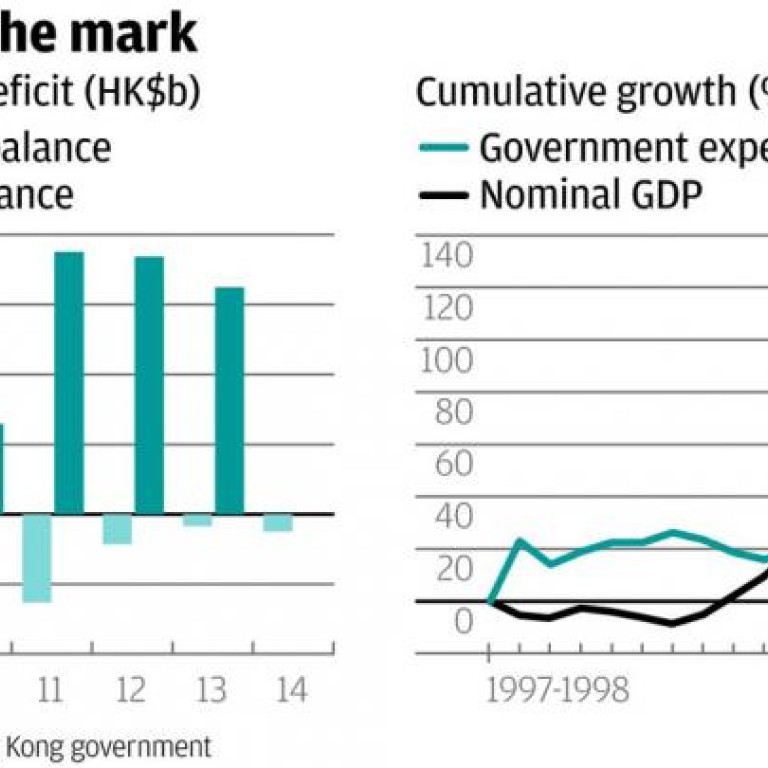
At last Tsang accepts that our fiscal policy needs an overhaul
With the financial chief's history of inaccurate forecasts and one-off handouts, a new approach to planning the budget is long overdue
At least some of the criticism directed at John Tsang Chun-wah recently must have stung. In his budget speech yesterday, the financial secretary attempted to defend his piecemeal approach to fiscal policy while simultaneously promising to set up a working group to formulate "more comprehensive planning for our public finances".
A new approach is badly needed. A year ago, Tsang predicted he would run a deficit of HK$3.4 billion for the 12 months to March.
Like others, was dubious. Once the figures were in, this column looked back at Tsang's history of inaccurate budget projections and on June 29 declared "on that form, the HK$3.4 billion deficit he is forecasting for the current fiscal year will end up as a HK$61 billion surplus".
Even that prediction was too cautious. Yesterday, Tsang estimated the government would actually turn in a surplus this year of HK$64.9 billion.
With this embarrassment of riches at his disposal, Tsang resorted to his usual grab bag of "one-off" handouts, including an HK$11.6 billion rate waiver and a HK$4.5 billion subsidy for household electricity bills.
In total, Tsang said his "relief measures" would be worth HK$33 billion. Coupled with a sharp rise in infrastructure spending and a much-needed increase in welfare for the elderly, these will drive up government spending by 16 per cent next year.
At the same time, however, Tsang predicted a HK$10 billion decline in government revenues, leading him to forecast yet again that the government will end up in the red, with a deficit for the next fiscal year of HK$4.9 billion (see the first chart).
Again this looks excessively conservative, especially as private-sector analysts are expecting Hong Kong's economic growth to accelerate from last year's 1.4 per cent rate to come in above the upper limit of Tsang's 1.5 to 3.5 per cent range for this year.
The trouble with forecasts as wide of the mark as Tsang's is that they make a nonsense of long-term fiscal planning.
Refusing to recognise that it is running a structural surplus, each year the government predicts a deficit, and when it ends up comfortably in the black, Tsang hastily assembles a few "one-off" handouts.
Yesterday, he defended this approach, saying "one-off measures, from a micro perspective, can help ease the community's burden".
This is doubtful. Considering Tsang claimed that last year's package of relief measures was worth HK$80 billion, this year's relatively miserly HK$33 billion is actually a net clawback as far as the community is concerned.
Instead of collecting too much revenue on the back of overly conservative forecasts, and then doling out some of the surplus on an ad hoc basis, it would be far more sensible to make permanent cuts in taxes and other revenues so that businesses and households can make long-term financial plans of their own.
Despite defending his unsystematic giveaways, Tsang appeared to acknowledge this yesterday, saying he would set up a working group to draw up a longer-term approach to Hong Kong's fiscal planning.
This is long overdue. Although the government professes an admirable desire to limit its budget to no more than 20 per cent of gross domestic product, under Tsang's stewardship, government spending has grown far faster than GDP (see the second chart).
A counter-cyclical fiscal boost is all very well in hard times, but it needs to be reined back when the economy picks up. Under Tsang, however, the government's fondness for high spending on big projects is in danger of becoming an addiction. Next year, spending is projected to climb to 22 per cent of GDP, even though the city is entering a cyclical upswing.
With the welfare burden imposed by an ageing population mounting rapidly, this approach cannot continue. Hopefully, all the criticism has helped Tsang and his officials to see sense.

